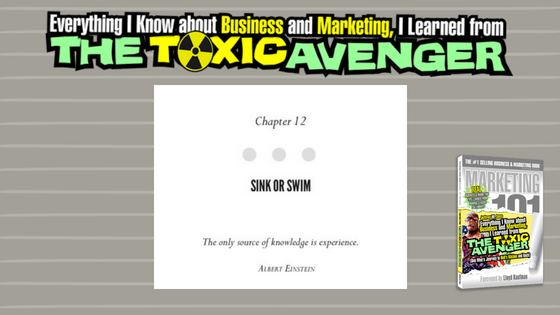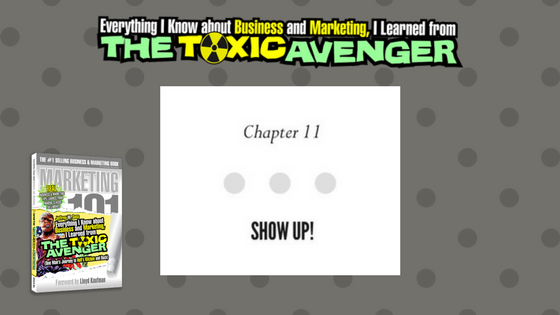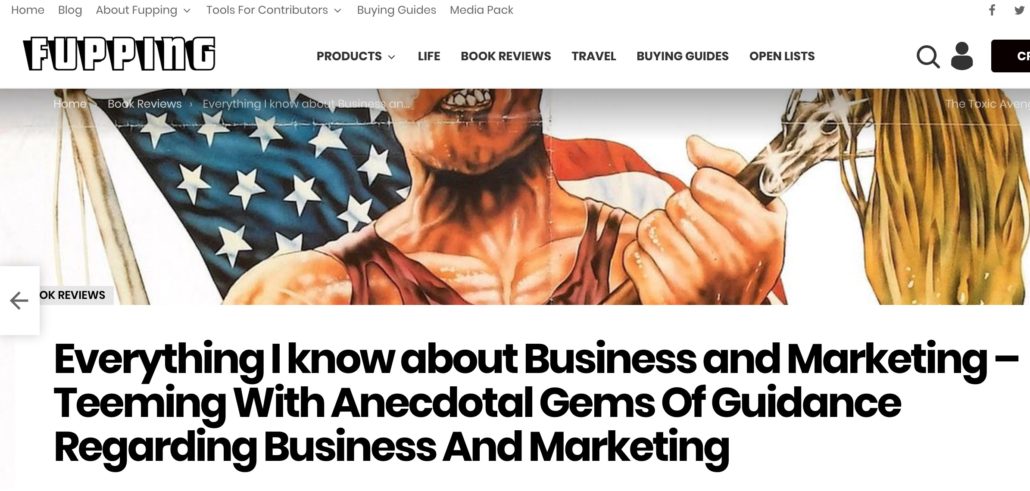Chapter 12: Sink or Swim!
Greetings from Tromaville! Here is Chapter 12 from my book, Everything I Know about Business and Marketing, I Learned from THE TOXIC AVENGER. In this chapter, I talk the many opportunites Troma affords to aspiring filmmakers and the benefits of giving people a chance to do something they have never done before… What do you think?
If you haven’t done so already, you can read the Foreword by Troma co-founder, Lloyd Kaufman, and the Introduction to the book as well as Chapter 1, 2, 3, 4, 5 and 6, 7 , 8, 9, 10 and 11. You can also see me read a few chapters live, along with Lloyd and Toxie, at Florida Supercon as well as a few chapters I read on Facebook Live. Stay tuned for additional chapters to be published here. If you like what you read and can’t wait for more, please don’t be shy. You can buy the book now on Amazon (and also please don’t be shy about sharing, and reviewing the book when you do read it.) Both Toxie and I greatly appreciate your support! – Jeff Sass
Chapter 12: Sink or Swim!
The only source of knowledge is experience.
—ALBERT EINSTEIN
And thus, Tromaville has perhaps been the greatest film school ever. Literally, no application process or qualifications required. No tuition. Virtually every student is a scholarship case. Show up eager and ready, and you are likely to be put to work. Present even a modicum of initiative, and you are likely to be given a chance to operate at a level you have no reasonable qualifications for, and in 90 percent of the time, no chance of actually being any good at it or succeeding. More than likely you’ll quit, sobbing and broken, and never set foot on a movie set again, let alone say anything remotely kind about your personal experience in Tromaville.
But, if you’re in that 10 percent who make it, who actually rise to the occasion, set the bullshit aside, and get the job done, your stint in Tromaville will be the best experience you could ever have, and you will learn career-inspiring and career-changing lessons. It’s film school on steroids. It’s sink or swim.
Never underestimate the power of just doing it. There’s a reason the famed Nike slogan has endured all these years. “Just do it” is often the best way to grow and learn (and it sounds a hell of a lot better than “sink or swim”). But, in Tromaville, where madness and opportunity abound, anyone at any time may be given the opportunity to step up to walk the plank, dive into the unknown, and truly sink or swim. Never directed a second unit? Now’s your chance. Never designed and sewn a wardrobe from scratch? Now’s your chance. Never written lines of dialogue at 1:00 a.m. that actors would speak in front of the camera at 7:00 a.m.? Now’s your chance. Ever convince the monsignor of a local church to allow you to shoot scenes of violence, drug use, and debauchery inside their lovely chapel? I did (and I had no idea what I was doing…the first time).
Experienced talent costs money. Giving experience to newbies costs nothing. It’s hit or miss, sink or swim. Most will implode and fuck up, but many will do just fine, and some will be amazing, and somehow, everything will get done, and the film will get made.
That’s Troma. Better to be finished than to be perfect.
That’s a lesson, too. The best way to learn is simply to do. Take a chance by doing something you’ve never done before. Give a chance by delegating to someone who has never done it before. Of course, you need to supervise them and make sure the whole project doesn’t implode, but within reason, let them make the noncritical mistakes they can learn from.
•••
That’s Chapter 12 – Another valuable lesson I learned making Troma movies: The best way to learn is to do! Stay tuned for “Chapter 13: “Embrace your Vision and Culture” which focuses building a company culture… but not a cult!
The book in previous posts:
Foreword, by Lloyd Kaufman
Introduction: Lights, Camera, Action!
Chapter 1: Welcome to Tromaville!
Chapter 2: The Troma Building
Chapter 3: Meet the Moguls
Chapter 4: Trailer Trash
Chapters 5 and 6: Working FREE-lance & Becoming a Full-time Tromite
Chapter 7: Branding Begins on the Ground Floor
Chapter 8: The Power of We
Chapter 9: Old Yeller (and Be Your Brand)
Chapter 10: Find Something to Believe In
Chapter 11: Show Up!











